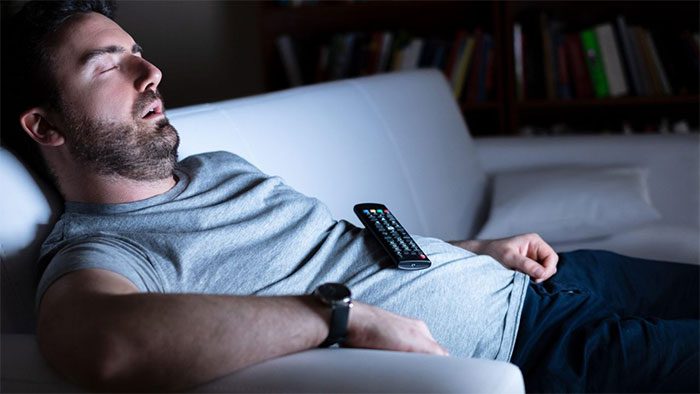Napping on the sofa while watching TV is a common habit for many people, but it is not as harmless as one might think.
According to Sputnik News, researchers at Northwestern University Feinberg School of Medicine in Chicago (USA) warn that, in fact, frequent napping while watching TV can lead to various health risks, including early death.
A new sleep study titled “Nighttime Light Exposure in Older Adults” evaluated the health status and sleep habits of 552 individuals aged 63 to 84. The focus of the study was to determine the impact of ambient light, also known as general lighting – the overall light level in a room – on sleeping individuals.

Illustrative image – Shutterstock
The study found that individuals who sleep with even the smallest amount of light are more likely to develop diabetes, obesity, and high blood pressure.
“People should do their best to avoid or minimize the amount of light they are exposed to while sleeping,” warned researcher Phyllis Zee. She explained that the reason ambient light can harm health is due to insulin resistance.
Insulin resistance is a condition where a person’s cells in muscle, fat, or liver do not respond effectively to insulin and cannot properly use blood glucose for energy. This deficiency forces the pancreas to produce more insulin, which over time causes blood sugar levels to rise.
According to the American Family Physician journal, this particular condition is often associated with type 2 diabetes, high blood pressure, and cardiovascular disease.
Insulin resistance is more likely to occur in the morning after a person has slept in a room with ambient light or light emitted from the TV.
“We are pointing out a fundamental mechanism to explain why this happens. We show that it affects your ability to regulate glucose,” the experts emphasized.
Data cited in the study indicates that 17.8% of participants who slept at night with ambient light were diagnosed with diabetes. In contrast, only 9.8% of those who slept in complete darkness were diabetic.
Another aspect of the study is obesity: approximately 40.7% of participants who did not reduce ambient light while sleeping were obese. For those who slept in darkness, only about 26.7% were obese.
There are several other important factors indicating how health can deteriorate when sleeping in a lit environment. For instance, such individuals often struggle to fall asleep and tend to sleep late. According to researcher Zee, late sleepers are also more likely to be at higher risk for cardiovascular diseases and metabolic disorders.
However, researchers caution that the TV is not the only device affecting sleep, as smartphones also contribute to nighttime distractions. A 2019 survey by Common Sense Media found that about 36% of teenagers and 26% of adults frequently wake up at night to check their mobile devices.
According to sleep experts, people should stop using their phones at least three hours before bedtime to avoid blue light from electronic devices tricking the brain into thinking it is still daytime.



















































